| Femmes Fatales | Dec 29 2023 |

No, she's not gold. She's something far better.

This Christmas themed image of Algerian born Italian star Edwige Fenech was made in 1976 while she was filming the comedy Cattivi pensieri, known in English as Evil Thoughts. She actually does in the film exactly what you see here, posing and dancing on a table while covered in holiday glitter, before being whisked off to bed by co-star Luc Merenda for some hazy focus softcore sex. Don't let that entice you into watching the movie, though. Fenech is a wonder, but she's done far better stuff.
| Vintage Pulp | Sep 27 2023 |

A murder by any other name would kill as dead.
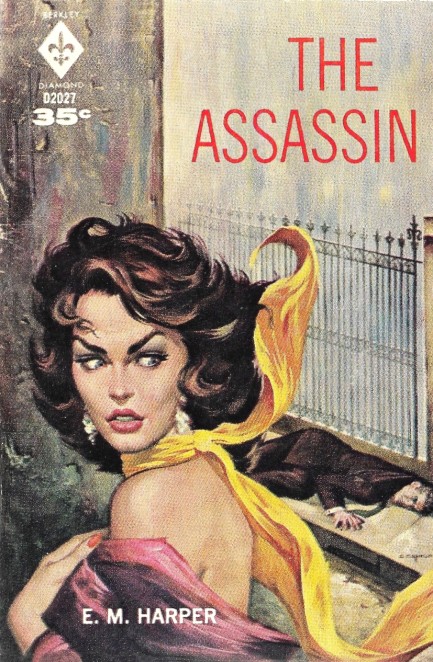
This is a rather pretty cover painted by Charles Copeland for E.M. Harper's 1960 novel The Assassin, the story of Alec Jordan, who's spared the guillotine in an Algerian prison but must repay the shadowy government operatives who freed him by murdering an Arab political figure. We've seen convicts turned into assassins a couple times in vintage literature. What sets this story apart is its many flashbacks to Jordan's youth, from the time he was witness to his moonshiner father's killing by cops, to being sprung from reform school to play high school football (seems someone always wants to put his skills to use), to his various war experiences.
The story begins in Paris, from which Jordan pursues his target to London and Vienna, world weary, haunted by the past, and hounded by the people who are operating him. There's, unsurprisingly, the requisite woman-from-his-past for whom he still has feelings—a beauty named Renée who married an Austrian count while Jordan was hors de combat. Conveniently, she's now a widow, but is reclaiming the past an option for Jordan? To survive but lose your soul, to resist corruption but be killed, to find redemption in love. You've read it before, and though Harper breaks no new ground plotwise, he wrote a contemplative iteration of the story that offers some enjoyment.
| Femmes Fatales | Dec 7 2022 |

You're too late. I already pulled it out of the stone, and now I'm in charge of everything.
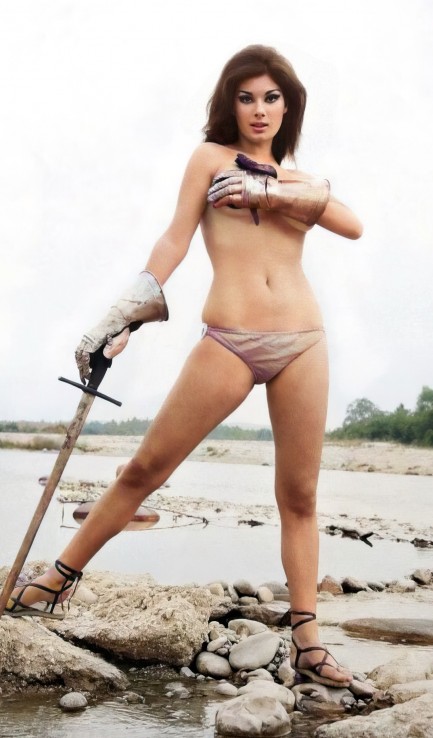
Edwige Fenech was born in Algeria when it was under French control, had Maltese and Italian parents, and became a film star in Italy, so theoretically she gets to rule all those lands, and possibly England too, since we figure she went there to do the sword pulling. Her first decree as wielder of Excalibur? Better titles for her movies. The photo, which is a colorization of a black and white original, was made for 1969's Alle Kätzchen naschen gern, known in English as All Kitties Go for Sweeties, or alternatively The Blonde and the Black Pussycat. All three of those are terrible names for a film. It was later titled in English The Sweet Pussycats, which is a little better. Obviously, it's a comedy, and if you were to guess it's too stupid to be funny you'd be right. However, anything with Fenech is worth a little something.
| Vintage Pulp | Feb 11 2022 |

Modesty Blaise is mmm mmm good.
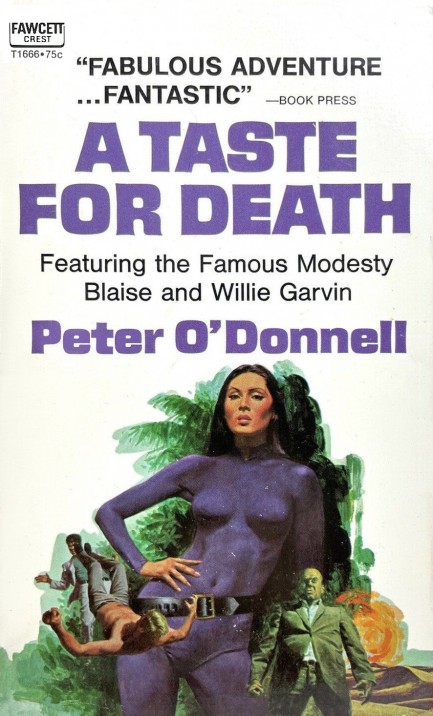
A Taste for Death was an entry in Peter O'Donnell's famed Modesty Blaise series, about an international criminal-turned-black ops death dealer. The previous three books featured Robert McGinnis fronts on the paperback editions, which you can see here, here, and here, but by the time this one appeared the paperback industry was shifting toward cheaper art—first photographic covers, and eventually computer graphics. The relentless pursuit of increased profits has cost society a lot, from beautiful urban cinemas to livable wages to entire forested mountaintops. Traditional paperback art isn't that important when measured against all the other losses, but it still represents the extinction of something enriching and fun. A Taste for Death was first published in 1969. This edition came from Fawcett Crest in 1972, with uncredited art which we consider to be the last painting of merit to appear on an English language Modesty Blaise paperback. More McGinnis pieces appeared on foreign editions, and we'll share those later. Also, some of the photo covers in the series are nice, and we may share those too.
The book brings back a villain Blaise and her sidekick Willie Garvin thought they had defeated in installment one, the nasty international jewel thief Gabriel, who this time is teamed up with a gorilla of a man named Simon Delicata in a plot to wrest the ancient and priceless Garamantes jewels from an Algerian archaeological dig. They've kidnapped Garvin's girlfriend Dinah Pilgrim, who can find precious metals and gems using dowsing rods and heightened senses. It's a typically imaginative set-up from O'Donnell, who we mentioned before creates villains fit for a James Bond movie. They're never just bad guys—they're freaks of criminality and terrifying physical specimens. Blaise and Garvin always have their hands full, and that's especially true in A Taste for Death, which features not only the wily Gabriel and the beast Delicata, but a master fencer named Wenczel eager to pincushion the heroes. We suggest you get a taste for Modesty Blaise. As fanciful spy capers go, her adventures usually hit the spot.
The book brings back a villain Blaise and her sidekick Willie Garvin thought they had defeated in installment one, the nasty international jewel thief Gabriel, who this time is teamed up with a gorilla of a man named Simon Delicata in a plot to wrest the ancient and priceless Garamantes jewels from an Algerian archaeological dig. They've kidnapped Garvin's girlfriend Dinah Pilgrim, who can find precious metals and gems using dowsing rods and heightened senses. It's a typically imaginative set-up from O'Donnell, who we mentioned before creates villains fit for a James Bond movie. They're never just bad guys—they're freaks of criminality and terrifying physical specimens. Blaise and Garvin always have their hands full, and that's especially true in A Taste for Death, which features not only the wily Gabriel and the beast Delicata, but a master fencer named Wenczel eager to pincushion the heroes. We suggest you get a taste for Modesty Blaise. As fanciful spy capers go, her adventures usually hit the spot.
| Vintage Pulp | Oct 11 2021 |

Shit, that waiter is fast! The meal sucked and his service was worse, but maybe we should have tipped him anyway.
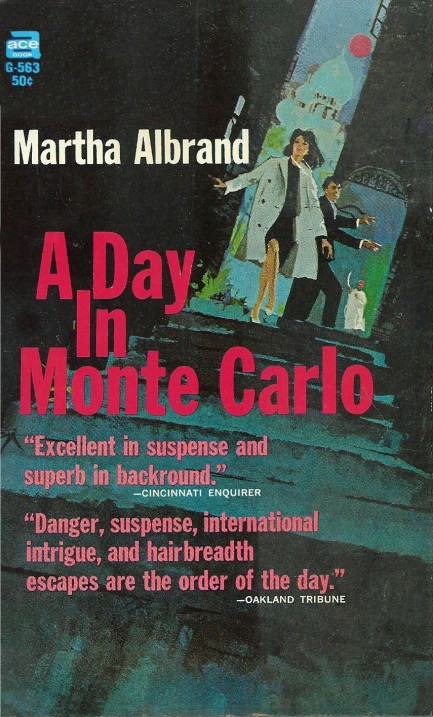
This cover for the 1965 Ace Edition of Martha Albrand's 1959 novel A Day in Monte Carlo caught our eye for a couple of reasons. One is the nice art by an unknown, but the other is because we're almost finished with David Dodge's 1952 travel book The Poor Man's Guide to Europe, and it encompasses the south of France. Why read a 70 year-old travel book? We knew it would be like a priceless time capsule—and it is. We'll get to it a bit later, but suffice to say it made us see this cover as two vacationers stiffing a waiter who's now chasing them with a scimitar. As you'd expect, however, this is actually an espionage novel, and a well reviewed one.
But sadly, A Day in Monte Carlo, which you might categorize as romantic suspense, is silly. Its main flaw is that the central relationship between American spycatcher Mark and French dancer Fleur is built on the gimmick of love at first sight. They meet, fall in love within minutes, and agree to marry before half a day has passed. After that point one of the main sources of plot tension becomes: how can Mark carry on a love affair and still chase the great and mysterious Timgad, mastermind behind the Algerian rebel movement, who flits from the Sahel to the Riviera with the ease of a migratory hawk? Well, there's an answer to that, though not a good one.
Albrand was something of an expert at this type of fiction, having published other novels in the same vein, but reputations can deceive. A great writer, perhaps, could pull all this off, but Albrand, whose go-to lines are things like, “Oh, Mark, I was so afraid. Is it really worth it to love this much?” is not a great writer. At least not in this book. We've actually seen her compared to the aforementioned David Dodge, who in addition to travel books wrote fiction classics like To Catch a Thief. But while Dodge wrote with wit, panache, and a touch of romance, he also wrote with gravity and grit. A Day in Monte Carlo needs a dose of the latter two qualities. Onward and upward.
| Femmes Fatales | Jul 27 2021 |

I'm off to see my hair stylist, then I'm headed to the pet groomer. Conveniently, they're the same person.

Bet you didn't notice the dog at first, but there he is, such a happy boy, clutched to the bosom of French actress France Anglade. The beautiful mademoiselle Anglade was born in 1942 in Constantine, France, and if you can't quite place that town, that's because today it's in Algeria. See, the French thought of Algeria as just a southerly department of France, which must have made the locals who'd had their land taken over feel a little better about it. Anglade briefly took over French cinema, appearing in an amazing seventeen films from 1962 to 1964. She continued acting until 1994, and when all was said and done had starred in efforts such as Le plus vieux métier du monde, aka The Oldest Profession, 24 Hours To Kill, and Les bricoleurs, aka Who Stole the Body? This amazing photo first appeared in Cinémonde magazine in 1967.
| Vintage Pulp | Oct 17 2019 |

Crossing this desert we'll eventually be reduced to wearing filthy, sweat-crusted rags, but I'm glad we started out looking so fabulous.
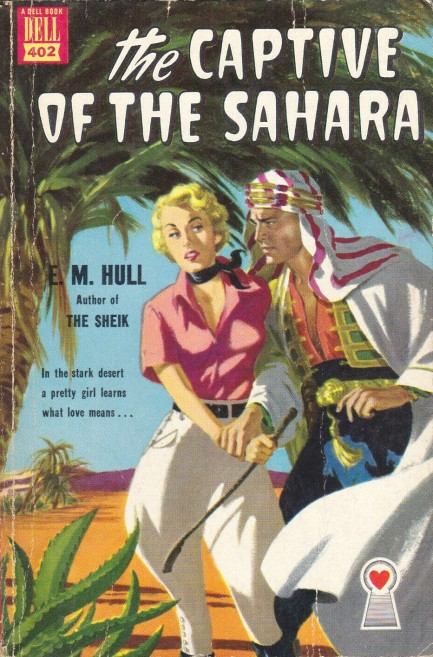
The pretty Harry Bennett cover art on this paperback won us over. Plus we wanted to read something set in the Sahara. Our trip to Morocco incubated strong interest in vintage fiction set in the region. The Captive of the Sahara was written in 1939 originally, with this Dell edition coming in 1950. British author E.M. Hull—Edith Maud to her friends, we bet—conjures up a tale here that's pure Arabian Nights, one of those florid books filled with words like “insensibly,” and where women suffer from heaving breasts and quickening pulses. This was Hull's realm. She published other books with similar settings, including 1919's The Sheik, which became a motion picture starring Rudolph Valentino
In The Captive of the Sahara virginal one percenter Isma Crichton travels for the sake of adventure to the City of Stones, and there in the trackless Algerian desert lustful Sidi Said bin Aissa decides to make dessert of her. Full disclosure: we're too corrupted to really enjoy books that hint around sex with poetic language. We're pulp guys. We can't help wanting these pale, trembling flowers to get properly laid, three or four detailed times, but that isn't Edith Maud's writerly plan. What happens is bin Aissa forces Isma to marry him, and a battle of wills follows as he tries to convince and/or bully her into relinqushing what he feels is rightfully his—her vagina.
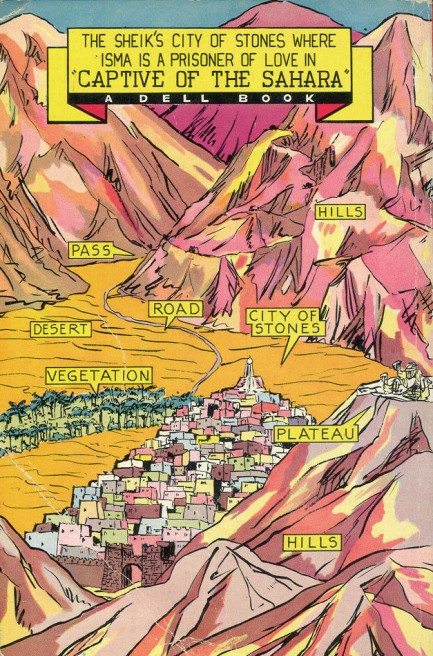
Under these circumstances we were not keen to see Isma laid, properly or any other way. And that's effective writing for you. We had sneered through most of the book but now were rooting for Isma to escape her desert prison and return to dashing David—a childhood friend whose confession of love was the original trigger for her fearful (did we mention that virgin thing?) departure and eventual trip to the City of Stones. We have to give Edith Maud credit—she sucked us into to this tale, and we liked it in most parts, but we certainly shan't (see her influence?) be recommending it. It's overwrought, often silly, and at times viciously racist. But hey, if you're looking for a literary adventure-romance, this might be it.

| Vintage Pulp | Jun 11 2016 |

That's fine, mister—I want the other one anyway. Before the school got bombed she was my sex ed teacher.
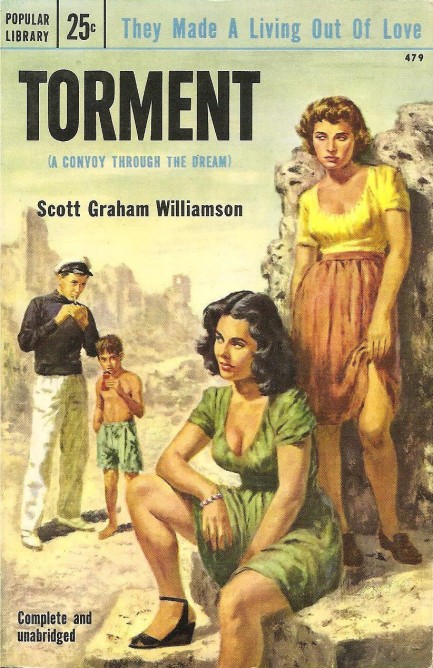
This cover depicting a grown man and a pre-teen boy browsing a pair of working girls is kind of creepy, we know, but it's also well executed. Originally titled A Convoy Through the Dream and published in 1948, Torment appeared in this Popular Library edition in 1953. Author Scott Graham Williamson tries for Hemingway with a story set in various sites around the Mediterranean during World War II, including Gibraltar, Algeria, and particularly Palermo, Sicily. Basically, a radio officer on a warship and his wife try to maintain their love and fidelity in a time of chaos and separation. This comes complete with that familiar war novel plot device—one last incredibly dangerous mission before the hero can go back home. The cover art is uncredited.
| Femmes Fatales | Oct 26 2011 |

If a woman strips in the forest and no one sees her, did it really happen?

Edwige Fenech was born Edwige Sfenek in French-controlled Algeria to Maltese and Italian parents, and went on to become one of the most inspiring sex symbols of the late ’60s and early ’70s, acting in giallos, comedies, and horror films, hosting a chat show in the 1980s, and recently appearing in Hostel: Part II. The striking image above is from the West German magazine Sexy, and it dates from 1971 or 1972. The caption tells us Fenech is the “Traum-Girl der Woche,” or Dream-Girl of the Week.
| Femmes Fatales | Jun 6 2010 |

Geometrically speaking she has no analogue.

Algerian-born French actress-turned-astrologer Elizabeth Teissier, shown here in a shot originally published in the French magazine Moi, 1970.





































































